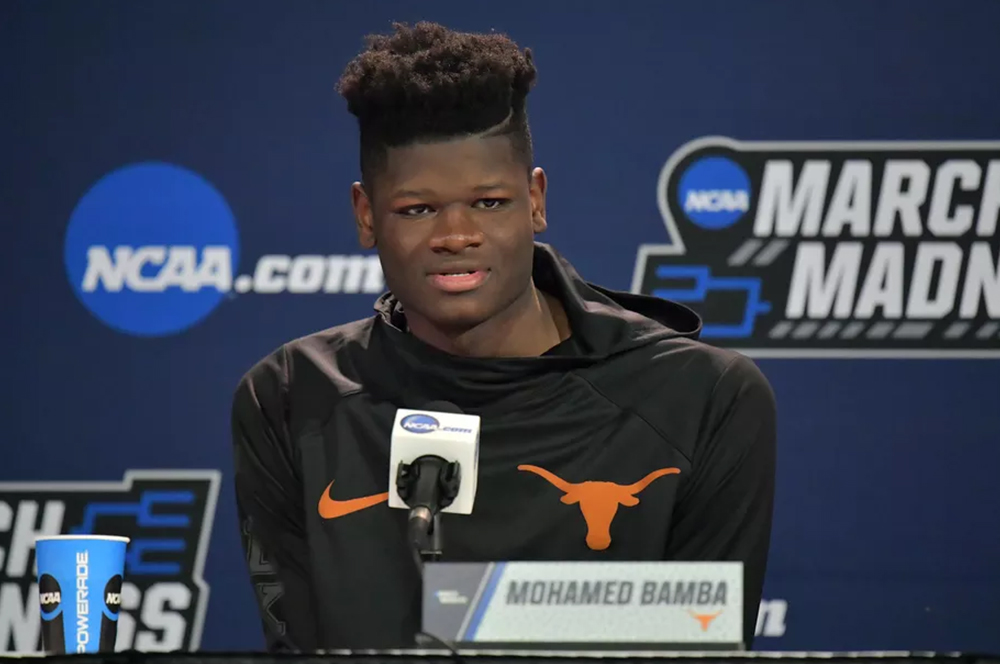Mo Bamba is the latest to give a lottery team the cold shoulder, but it happens all the time.
Mo Bamba hit headlines this week for something he didn’t do.
The Texas big man reportedly refused to visit with the Memphis Grizzlies, who pick No. 4 in Thursday’s NBA Draft. He also won’t submit his private medical records, and has apparently openly stated he does not want to play for Memphis.
Harsh! Depending on your perspective, this is either an outrage or a righteous example of an incoming NBA rookie claiming whatever slice of power of agency he can find.
Regardless, it’s all overblown.
Workouts are basically meaningless. None of the players in this upper class of prospects are participating in competitive workouts, just drills and the like at most. There are legends of good players convincing teams to draft them with epic workouts; they are just as many tales of teams falling in love with a guy during a 1-on-0 workout and ending up with a bust.
Meanwhile, the medical info issue seems like something of a red herring. All players who attend the NBA Draft combine — including Bamba — submit to medical examinations, the results of which are shared with all 30 teams. These exams include EKGs and X-rays. While one assumes the players’ camps have deeper info and that team-based exams would be more invasive and illuminating, the league’s exam should cover the major concerns.
Bamba and other prospects have plenty of tape available — he played 900 minutes for the Longhorns this year, and was something of a known quantity in a scouting sense before that.
Memphis would surely learn more about Bamba from having him visit, from having him submit to a doctor’s notebook, from putting him through shooting and running drills. But it hardly seems necessary.
That Bamba’s camp would think that withholding this extra information and even stating that the center would rather play elsewhere could convince the Grizzlies to skip him if he’s truly atop their board speaks less to proven strategy than the vast power imbalance at play at the core of the NBA Draft.
As Kristian Winfield noted, once you’re drafted into the NBA, that team could essentially control your career for at least seven years due to the rookie scale and restricted free agency. The first-round rookie scale is four years long, with team options embedded. There’s no way out but to bust completely. Restricted free agency allows incumbent teams to match offer sheets players sign coming off their rookie deals. The only way to avoid that is for said players to sign qualifying offers to play for the team that drafted him at a discount for one additional year and become an unrestricted free agent after Year 5 in the NBA. No max-level players have been willing to take that path.
The problem at its core is the NBA Draft is a terrible way to incorporate new players into the league. Athletes fought tooth and nail for the right to free agency. That this right isn’t extended to the youngest, least powerful athletes in the sport is absurd. Rookies deserve the right to choose where they work so long as the teams want to hire them.
This doesn’t mean we should do away with rules to ensure some level of competitive balance. But if a player like Bamba really doesn’t want to play for the Memphis Grizzlies, why should he have to? Why do 26-year-old basketball players have a freedom to choose where to live, but 20-year-olds don’t?
Since Bamba lacks that basic freedom of choosing where to work, he has to use whatever minor lever of power he can grab to influence his future. Unfortunately, that only lever he has is mostly worthless. The Grizzlies can be reasonably assured Bamba will play for them if drafted. Rookie holdouts basically never happen any more in the NBA, and if the league’s medical exam came up clean, there’s relatively little risk for Memphis beyond Bamba’s own potential.
Fans of teams like Memphis or the Sacramento Kings (who often find prospects avoiding pre-draft workouts like the plague) should understand that in a system that deprives prospects of freedom, they are simply (over-)extending what little power they have. The system is awful, and that manifests with the petty disrespect that happens in situations like what the Grizzlies are dealing with in regards to Mo Bamba.
Don’t take it personal.
